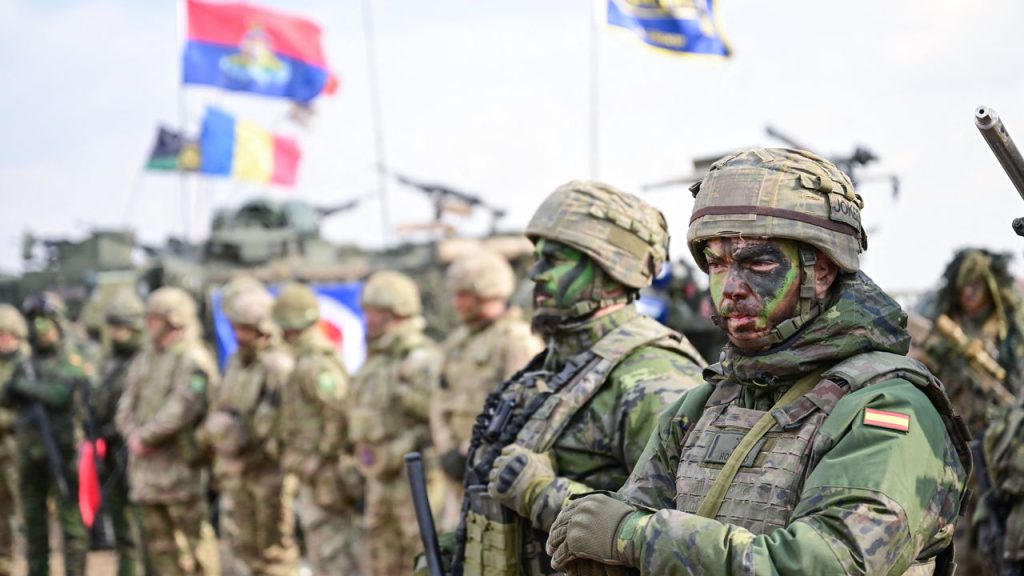Your browser does not support the element.
The realisation is sinking in. Europe needs to become able to defend itself without America’s help. From Friedrich Merz, Germany’s probable next chancellor, to Emmanuel Macron, the president of France and longtime advocate of “strategic autonomy”, politicians are calling for higher defence spending. The calls are welcome, indeed long overdue. The problem is that, so far, neither politician has offered much in the way of ideas on where the money for it is supposed to come from.
Currently, the EU’s member states spend some €325bn ($340bn) a year on defence, which comes to about 1.8% of the bloc’s GDP. That is still, three years into the war in Ukraine, less than the 2% target that NATO set its members in 2014 after Russia had illegally annexed Crimea and occupied the eastern Donbas region. Guntram Wolff of Bruegel, a think-tank in Brussels, and Alex Burilkov of Leuphana University Lüneburg calculate the immediate requirement at 3.5% of GDP for Europe to be able to defend itself without the Americans—and in the longer term The Economist thinks expenditures will need to be more like 4-5%. Even the 3.5% figure leaves a gap of 1.7% of GDP to be filled.

Europe’s spending to support Ukraine is equally underwhelming. Since January 2022 the EU and its member states have spent €113bn in financial, military and humanitarian help, the equivalent of just above 0.2% of their GDP during each of those three years, according to data from the Kiel Institute, a think-tank, and additional calculations by The Economist. For Europe to replace America’s support, were it withdrawn, the EU would need to raise its contribution by roughly the same again. The combined 0.4% of GDP that would need to be spent on Ukraine each year is only half the level at which Denmark spends already on the embattled country, and about the same as Finland does (see chart). This shows it is possible, and that backing Ukraine is only a small part of the much larger task of beefing up Europe’s own defence spending.
There are three ways to find the extra 1.9% of GDP that would be needed both to boost defence spending to 3.5% of GDP a year and, in addition, replace American support for Ukraine. The first is by cutting spending elsewhere and/or raising taxes. But global rankings of the highest-tax countries in the world are dominated by European countries, so further increases seem a bad (and unpopular) idea. Euro-zone economies spend about 20% of their GDP on welfare, pensions and social protections, but cuts to social spending would be equally unpopular. Many countries are already under pressure to cut spending or raise taxes to reduce their deficits. France, with some of the highest social spending in Europe, has already pledged to cut its deficit from 6.1% in 2024 to 4% by 2027. In Germany, a coalition government collapsed last year because it could not agree on sufficient cuts, and the incoming one is sure to struggle in the same way. Squeezing national budgets yet further to boost defence will be politically painful.

The second option is to borrow. Countries could widen their deficits for a while and agree to adjust the bloc’s fiscal rules. Ursula von der Leyen, the president of the European Commision, has suggested an “escape clause” for defence investments. But the rules have no such provision, so would need another contentious reform. “The mindset is still some emergency exception that takes away the guardrails,” argues Lucas Guttenberg of Bertelsmann Foundation, a think-tank. Germany has already hinted that any exception to the rules can apply only to those countries that spend more than 2% of GDP on defence. That would exclude Italy and Spain. “I cannot imagine Spain spending more than 2% on defence,” says Luis Garicano of the London School of Economics. “Spaniards, far from Russian aggression, remain unconcerned about war.”
The third option would be to fund defence spending through the EU. After the pandemic struck, the bloc’s €806bn recovery fund pioneered that concept. The EU would take on debt, to be serviced and later repaid from the EU budget. But there are snags. Setting up such a fund requires unanimity, and pro-Russia countries like Hungary and Slovakia would probably object, though they might be pressured into it. It would raise the debt burden of the bloc as a whole, even if such debt did not count towards national figures. And the EU would need to agree what to spend it on and for whose benefit. This would take time.
To close the gap of 1.9% of GDP, consider all options. For example, national governments could tighten their budgets and cut other outlays to lift defence spending plus support to Ukraine by, say, 0.3% of GDP a year. That would leave a gap of “only” some €850bn between now and 2030, which would need come from a combination of higher national deficits and more EU debt, with a big impact on the EU’s next seven-year budget cycle. High time, then, for fans of Europe’s autonomy, such as Mr Macron and Mr Merz, to make the case for cuts to welfare spending and farm subsidies, and prepare the ground for more fiscal integration in the EU. Until then, their calls for strategic autonomy are so much hot air. ■
To stay on top of the biggest European stories, sign up to Café Europa, our weekly subscriber-only newsletter.
Stay on top of our defence and international security coverage with The War Room, our weekly subscriber-only newsletter.


